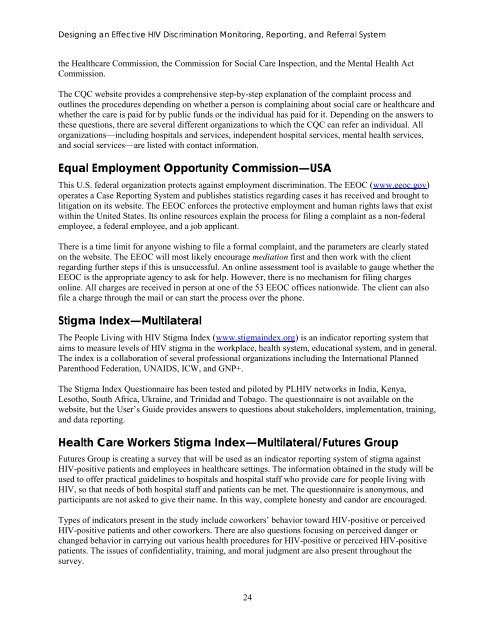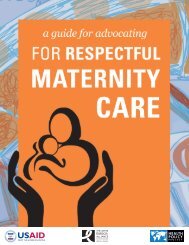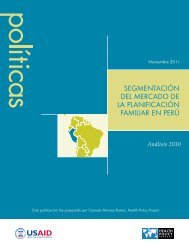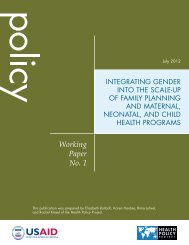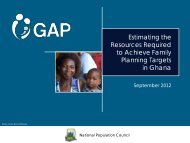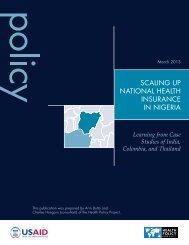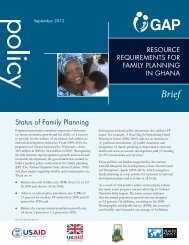English Version - Health Policy Project
English Version - Health Policy Project
English Version - Health Policy Project
You also want an ePaper? Increase the reach of your titles
YUMPU automatically turns print PDFs into web optimized ePapers that Google loves.
Designing an Effective HIV Discrimination Monitoring, Reporting, and Referral System<br />
the <strong>Health</strong>care Commission, the Commission for Social Care Inspection, and the Mental <strong>Health</strong> Act<br />
Commission.<br />
The CQC website provides a comprehensive step-by-step explanation of the complaint process and<br />
outlines the procedures depending on whether a person is complaining about social care or healthcare and<br />
whether the care is paid for by public funds or the individual has paid for it. Depending on the answers to<br />
these questions, there are several different organizations to which the CQC can refer an individual. All<br />
organizations—including hospitals and services, independent hospital services, mental health services,<br />
and social services—are listed with contact information.<br />
Equal Employment Opportunity Commission—USA<br />
This U.S. federal organization protects against employment discrimination. The EEOC (www.eeoc.gov)<br />
operates a Case Reporting System and publishes statistics regarding cases it has received and brought to<br />
litigation on its website. The EEOC enforces the protective employment and human rights laws that exist<br />
within the United States. Its online resources explain the process for filing a complaint as a non-federal<br />
employee, a federal employee, and a job applicant.<br />
There is a time limit for anyone wishing to file a formal complaint, and the parameters are clearly stated<br />
on the website. The EEOC will most likely encourage mediation first and then work with the client<br />
regarding further steps if this is unsuccessful. An online assessment tool is available to gauge whether the<br />
EEOC is the appropriate agency to ask for help. However, there is no mechanism for filing charges<br />
online. All charges are received in person at one of the 53 EEOC offices nationwide. The client can also<br />
file a charge through the mail or can start the process over the phone.<br />
Stigma Index—Multilateral<br />
The People Living with HIV Stigma Index (www.stigmaindex.org) is an indicator reporting system that<br />
aims to measure levels of HIV stigma in the workplace, health system, educational system, and in general.<br />
The index is a collaboration of several professional organizations including the International Planned<br />
Parenthood Federation, UNAIDS, ICW, and GNP+.<br />
The Stigma Index Questionnaire has been tested and piloted by PLHIV networks in India, Kenya,<br />
Lesotho, South Africa, Ukraine, and Trinidad and Tobago. The questionnaire is not available on the<br />
website, but the User’s Guide provides answers to questions about stakeholders, implementation, training,<br />
and data reporting.<br />
<strong>Health</strong> Care Workers Stigma Index—Multilateral/Futures Group<br />
Futures Group is creating a survey that will be used as an indicator reporting system of stigma against<br />
HIV-positive patients and employees in healthcare settings. The information obtained in the study will be<br />
used to offer practical guidelines to hospitals and hospital staff who provide care for people living with<br />
HIV, so that needs of both hospital staff and patients can be met. The questionnaire is anonymous, and<br />
participants are not asked to give their name. In this way, complete honesty and candor are encouraged.<br />
Types of indicators present in the study include coworkers’ behavior toward HIV-positive or perceived<br />
HIV-positive patients and other coworkers. There are also questions focusing on perceived danger or<br />
changed behavior in carrying out various health procedures for HIV-positive or perceived HIV-positive<br />
patients. The issues of confidentiality, training, and moral judgment are also present throughout the<br />
survey.<br />
24


